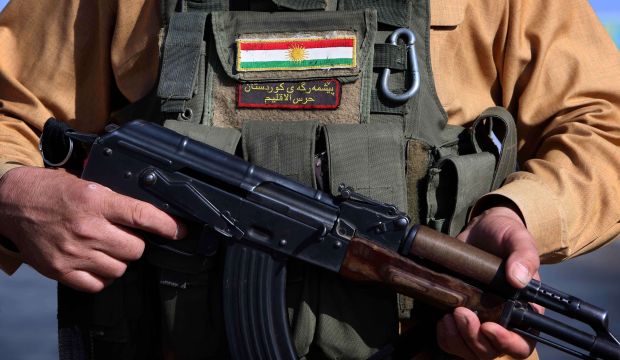
Iraqi Kurdish Peshmerga fighters take position on the front line in Khazer, near the Kurdish checkpoint of Aski Kalak, 25 miles (40 kilometers) west of Erbil, the capital of the autonomous Kurdish region of northern Iraq, on August 8, 2014. (AFP/Safin Hamed)
Erbil, Asharq Al-Awsat—The high death toll among Kurdish forces over the past six month is due to the fact that the Peshmerga are the only “effective” fighting force in the battle against the Islamic State of Iraq and Syria (ISIS), senior Peshmerga officials have told Asharq Al-Awsat.
In comments to Asharq Al-Awsat, Peshmerga Ministry Secretary-General Lt. Gen Jabbar Yawar said: “The large number of Peshmerga troops who have been martyred or injured is due to the fact that we are fighting the most violent terrorist group, while we are also the only force on the ground that has managed to stem the flow of ISIS.”
Yawar’s comments come after the Ministry of Peshmerga announced that 727 Peshmerga fighters, including “officers, non-commissioned officers, members of the Asayish (intelligence agency), police and Peshmerga veterans,” have been killed over the past six month.
3,564 Peshmerga fighters were wounded fighting ISIS in the same period, the ministry said.
Kurdish Peshmerga forces were able to secure Kurdish territory in northern Iraq from ISIS control after the jihadist group took control of Iraq’s second city, Mosul, in June of this year. Erbil deployed its forces across a more than 600 miles (1,000 kilometers) front, including in areas that had not been under Kurdish protection such as Kirkuk, in order to prevent ISIS advances.
Kurdish forces, backed by international air strikes, have increasingly been able to push ISIS back following the formation of a US-led international anti-ISIS alliance.
“The international military assistance has helped us to achieve victory in all our battles with ISIS, stop their attacks and liberate all areas of Kurdistan that they had been in control of,” Yawar told Ashharq Al-Awsat.
“The arms that the international alliance has provided Peshmerga forces, as well as the air strikes being carried out by alliance forces on ISIS positions, have also had a large impact on the battle,” the Peshmerga Ministry Secretary-General said.
Yawar confirmed that ISIS are increasingly resorting to tactical withdrawals in the face of Peshmerga advances, booby-trapping cities they leave in order to slow down the Peshmerga-led liberation of ISIS territory.
A military advisor to the Kurdish Peshmerga Ministry, retired Kurdish officer Salah Al-Fili, called on the international alliance to provide Kurdish forces with the capabilities to defuse ISIS’s improvised explosive devices and continue the fight. “Peshmerga forces are in need of bomb disposal robots and bomb detection devices,” he told Asharq Al-Awsat.
Fili said that Peshmerga forces have now changed their tactics in light of ISIS’s new strategy, seeking to secure their position on the outskirts of ISIS-held towns before entry in order to reduce casualties from ISIS booby-traps.
